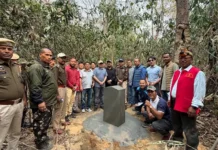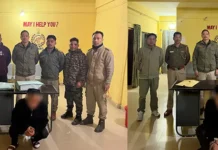Monday Musing
[ Tongam Rina ]
Depending on the mood of the government and its agencies, you could end up in jail or dead for just being a concerned citizen. If the government wants, it has ammunitions in the form of laws that can be used against citizens anytime.
Laws are made to govern citizens, and in some cases it is made to terrorise and silence people as is the current scenario in Arunachal.
If you are in Tirap, Changlang, or Longding, the Army can shoot you dead or injure you for absolutely no reason. No questions will be asked, and no one will be taken to task because it will be dismissed as case of mistaken identity. Under the Armed Forces Special Powers Act (AFSPA), which gives immense power to the security forces, citizens are always the suspects who deserves no respect or mercy. Enforced in Northeast states and Jammu & Kashmir, for decades the Act has been used for unspeakable violence by the Indian state against its own citizens – from executions to rape. Every six months, it’s extended for yet another six months. The cycle of repression and violence goes on with extreme precision. The AFSPA stands out because it’s a law to suppress, to inflict violence and fear, kill or maim, and to control and colonise a section of India’s own citizens. But there are no dearth of laws in India that’s draconian and violates basic human rights, irrespective of which part of the country you live.
If you express yourself, call a corrupt politician corrupt who needs to be dethroned, you could be in jail for inciting violence. Check Section 124 A of the Indian Penal Code, 1860. The National Security Act has nothing to do with national security, actually. Dare you ask ten of your social media followers to gather at IG Park or express your protest in a WhatsApp video or audio message, the Act could be invoked in the name of maintaining public order: 12 months in jail without trial.
The Unlawful Activities (Prevention) Act, 1967, empowers the government to detain citizens just for a mere protest. Student leaders, reporters, and human rights activists have been locked under this law. The government can proclaim anyone who does not agree with it as indulging in unlawful activity.
The Arunachal Pradesh Unlawful Activities (Prevention) Act, 2014, has repeatedly been used in the state since it was passed. The Act, a gift from the Congress, is now being lavishly used by the BJP.
This Act, which has been used by the government to silence and instill fear in citizens protesting against paper leak cases, is dangerous. In the name of preventive detention, any individual can be thrown in a jail with no chance to explain themselves for upto six months, anywhere in the state.
Initially for 12 days, detention can be extended with no questions asked and no provision of legal support.
This is not the first time the Act has been used, but this appears to be first time where mass arrests have been made. This law has been used against many who have been critical of the government. Demands for repealing the Act has been sporadic, but no serious attempt has been made seeking its repeal.
The government very well knows that to break the protest, the best policy is to make an example of a few names as how far it can go suppress anyone who dares question it. It knows that, after a few days of anger on social media, the people of the state will buckle under the pressure. Remember, this state does not have a tradition of civil society and our response to government atrocity has always been shortsighted, inconveniencing financially vulnerable citizens and destruction of properties.
There are lessons to be learnt from the latest episode.
Why is the government using the Act without fear when there is popular demand to work on the Arunachal Pradesh Public Service Commission paper leak case? The government knows very well that outrage over the issue is now limited to social media. The protestors gave a good chance to the government by announcing a prolonged bandh call which resulted in public discontentment. If it was for 12 hours, the government would not have dared because there still would have been mass support for the bandh.
Prolonged bandhs are restrictive, smack of arrogance, and curtail freedom which everyone longs for. It serves no purpose and it’s harassment in the name of a cause. The government got the chance to unleash on public its power and give an example of how far it will go to suppress popular voices.
For now, the government and its agencies may have managed to silence the citizens, but it’s a dangerous path chosen by the government. Using regressive laws on citizens asking for genuine rights, and locking up citizens in the name of public order is against the very tenets of democracy.


